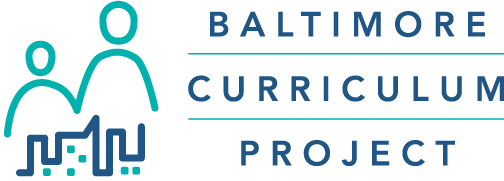“Be who you needed when you were younger.”
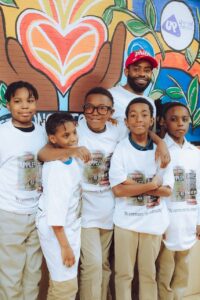
Haneef Hardy with a few mentees with Unlimited Potential Mentoring.
Haneef Hardy, founder of the nonprofit Unlimited Potential Mentoring (UPM), lives by those words.
This motto also drives his nonprofit, which supports children and teens in Baltimore and his native Philadelphia through three programs. In mid-December, prior to Winter Break, Mr. Hardy and his team launch the UPM program with Pimlico Elementary / Middle School (PEMS), operated by Baltimore Curriculum Project (BCP), one of Maryland’s largest public charter school operators.
On that date, PEMS parents and guardians will be able to “shop” (every toy and item is free) for holiday gifts at the school. Amazon, one of UPM’s national partners, is donating thousands of dollars of toys and holiday items for families in the Park Heights neighborhood.
PEMS is the second UPM school in Baltimore, which began at Furman Templeton Preparatory Academy, the charter school where Mr. Hardy first began teaching 1st grade in 2020 and the first UPM school. His goal is to introduce the full cadre of UPM programs to PEMS by spending the 2025-2026 school year building community awareness among the school community and Park Heights about UPM.
I am building our trust factor in the community before we do too much too early. “I am looking at everything that we have and seeing what the need is for the families in Park Heights and figuring out a way to be innovative and getting those things to the people that need them.
The Founding of Unlimited Potential Mentoring
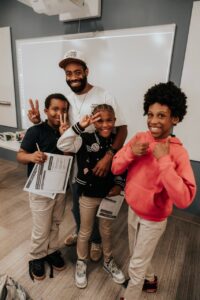 For every child served through UPM, Mr. Hardy has the same goal: to create a space where kids learn, grow, heal, develop, and learn the skills needed for success in the 21st century.
For every child served through UPM, Mr. Hardy has the same goal: to create a space where kids learn, grow, heal, develop, and learn the skills needed for success in the 21st century.
The genesis for UPM began when Mr. Hardy was adopted by his 8th grade teacher. At the time, Mr. Hardy, who was homeless and sleeping on friends’ couches in fifth grade, was part of her mentoring program at his middle school.
Encouraged by his adoptive mother and his mentor, he began running track for the first time in 11th grade. “Malcom X said that ‘Education was his passport to the future,’” Mr. Hardy adds. “My passport was track and field, which was therapy for me the first time I ran in 11th grade.” (That year, he won the Penn Relays in the 800-meter and 400-meter events, winning the Pennsylvania state championship for the 800 meter as a senior. At Morgan, he and his 400-meter relay team hold the university record for the top two finishes.)
He earned a track and field scholarship to Oklahoma University but transferred to Morgan State University (MSU) to follow a track team member who wanted support. Mr. Hardy thrived at MSU, earning his B.A. in education and, in 2020, his M.A. in sociology with a minor in program evaluation.
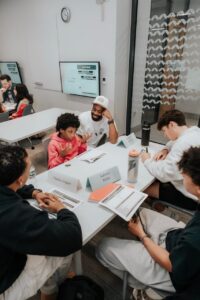 “Coming to Morgan was the best decision because at Oklahoma, I was just a small fish in a big pond,” he says. “At Morgan, I was a shark in a pond. I knew everybody on campus, but more importantly, my professors knew me.”
“Coming to Morgan was the best decision because at Oklahoma, I was just a small fish in a big pond,” he says. “At Morgan, I was a shark in a pond. I knew everybody on campus, but more importantly, my professors knew me.”
He also fell in love with Baltimore. “Baltimore has my heart,” Mr. Hardy explains. While in graduate school, he had to do a deep dive into a Baltimore community. His research on the rich history of Pennsylvania Avenue inspired him to knock on doors in West Baltimore to learn the neighborhood today. The West Baltimore zip code is like his home neighborhood in Philadelphia, where UPM bought and restored a vacant home out of which 13+ free programs from mentoring to academic enrichment and boxing and chess operate for youth.
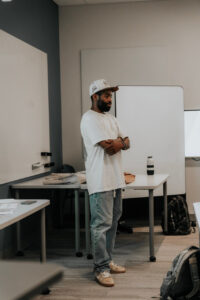 Mr. Hardy used his first COVID-19 stimulus check to create UPM; his second check paid for a nonprofit coach and coursework. “When I graduated, I committed to saving my younger self and taking my life experiences to help inspire, motivate, and provide opportunity for the next generation,” he explains. He began teaching 1st grade at Furman Templeton and met a boy who reminded him of his younger self. As Mr. Hardy began to support him in the way that others had supported his younger self, word spread. “One student turned to15 students, which inspired me to see myself outside the classroom,” he said.
Mr. Hardy used his first COVID-19 stimulus check to create UPM; his second check paid for a nonprofit coach and coursework. “When I graduated, I committed to saving my younger self and taking my life experiences to help inspire, motivate, and provide opportunity for the next generation,” he explains. He began teaching 1st grade at Furman Templeton and met a boy who reminded him of his younger self. As Mr. Hardy began to support him in the way that others had supported his younger self, word spread. “One student turned to15 students, which inspired me to see myself outside the classroom,” he said.
“My life circumstances—losing my parents and brother at a young age and my [birth] mom to suicide when I was 24—I’m just being who I needed when I was younger,” he adds. “My story is similar to a lot of black and brown kids growing up in Baltimore City. My father was killed in fifth grade, which was the start of my trauma. My 8th grade teacher poured into me more than I was sending myself that time and brought me into her household. That was the beginning of getting structure provided.”
The Unlimited Potential Mentoring Model
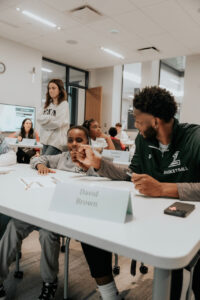 Mr. Hardy began the UPM program in earnest after asking his school if he could pivot to being a school-based partner to fill in the gaps in students’ lives he had witnessed as a teacher. He started with afterschool programming, growing UPM into its now three program offerings:
Mr. Hardy began the UPM program in earnest after asking his school if he could pivot to being a school-based partner to fill in the gaps in students’ lives he had witnessed as a teacher. He started with afterschool programming, growing UPM into its now three program offerings:
- Think First: an in-school programming mentorship focused on being proactive and not reactive and on building a positive school climate and culture.
- Fast Track: A school-based student entrepreneurship program in partnership with Amazon that creates a storefront in the school, organized and operated by 3rd through 5th-grade students. Families “shop” for free household products, clothing, school supplies, hygiene items, and more. Students attend a weekly class entitled “Creative Mindset” at Loyola University Maryland’s Sellinger School of Business and implement the coursework and entrepreneurial concepts in running a business. Mr. Hardy’s ultimate vision is that the students will use these skills to create success and economic growth within their own communities’ vacant storefronts.
- Uplift Committee: This grass-roots community program brings together any members of the community in monthly meetings, block parties, and more to celebrate and uplift the community where UPM programs exist to increase the network of support for UPM kids and families and to strengthen the community fabric.
The Pimlico Elementary / Middle School Connection
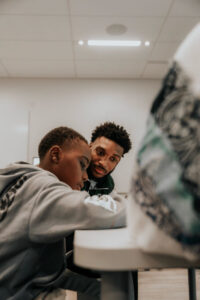 As word spread among the community about UPM’s work at Furman Templeton, Mr. Hardy was connected to PEMS Principal Nneka Warren. He learned more about PEMS and the history of the school and Park Heights community, realizing that it was the right school in which to grow his UPM intentions.
As word spread among the community about UPM’s work at Furman Templeton, Mr. Hardy was connected to PEMS Principal Nneka Warren. He learned more about PEMS and the history of the school and Park Heights community, realizing that it was the right school in which to grow his UPM intentions.
“Everything we do centers around youth being creative and understanding how things connect as they move forward in life,” he says. “Ultimately, with programs like Fast Track, for example, we want students to have access to higher education. UPM resources at a school create holistic community outreach, mentoring, sports, and more for students and families. We’re not here to take over. There’s no ego within it. We’re just trying to figure out how we can support the community.”
“I just want everybody, every child, to never feel like they cannot pursue the next thing, to feel supported, seen, heard, be understood, and to understand that they are human and we see them as such. Through UPM’s programs and resources, I want them to find their own spark.”
Thank you, Mr. Hardy and UPM, for your commitment to PEMS!
To learn more about United Potential Mentoring, visit unlimited-potential.org.
